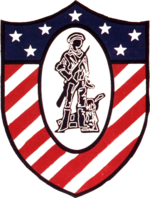
Back USS Ranger (CV-61) Czech USS Ranger (CV-61) German USS Ranger (CV-61) Greek USS Ranger (CV-61) Spanish یواساس رنجر (سیوی-۶۱) Persian USS Ranger (CVA-61) Finnish USS Ranger (CV-61) French USS Ranger (CV-61) Croatian レンジャー (CV-61) Japanese USS 레인저 (CV-61) Korean
 USS Ranger in August 1961
| |
| History | |
|---|---|
| Name | Ranger |
| Namesake | Ranger |
| Ordered | 1 February 1954 |
| Builder | Newport News Shipbuilding |
| Cost |
|
| Laid down | 2 August 1954 |
| Launched | 29 September 1956 |
| Sponsored by |
|
| Acquired | 1 August 1957 |
| Commissioned | 10 August 1957 |
| Decommissioned | 10 July 1993 |
| Reclassified | CV-61 |
| Stricken | 8 March 2004 |
| Identification |
|
| Fate | Scrapped, 1 November 2017 |
| Badge |  |
| General characteristics | |
| Class and type | Forrestal-class aircraft carrier |
| Displacement |
|
| Length | 1,071 ft (326 m) |
| Beam |
|
| Draft | 37 ft (11 m) |
| Propulsion |
|
| Speed | 34 knots (63 km/h; 39 mph) |
| Complement | 3,826 officers and men. |
| Sensors and processing systems | |
| Electronic warfare & decoys | Mark 36 SRBOC |
| Armament |
|
| Aircraft carried | 70–90 |
The seventh USS Ranger (CV/CVA-61) was the third of four Forrestal-class supercarriers built for the United States Navy in the 1950s. Although all four ships of the class were completed with angled decks, Ranger had the distinction of being the first US carrier built from the beginning as an angled-deck ship.
Commissioned in 1957, she served extensively in the Pacific, especially the Vietnam War, for which she earned 13 battle stars. Near the end of her career, she also served in the Indian Ocean and Persian Gulf.
Ranger was decommissioned in 1993, and was stored at Bremerton, Washington until March 2015. She was then moved to Brownsville for scrapping, which was completed in November 2017.
- ^ Jane's American fighting ships of the 20th century. New York, N.Y.: Mallard Press. 1991. p. 78. ISBN 0-7924-5626-2.